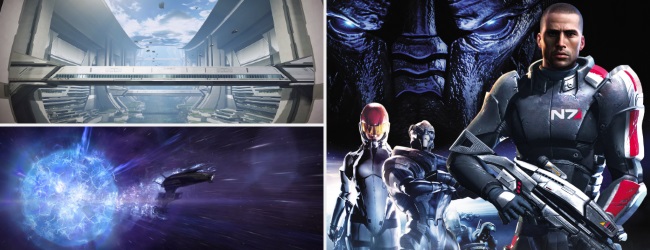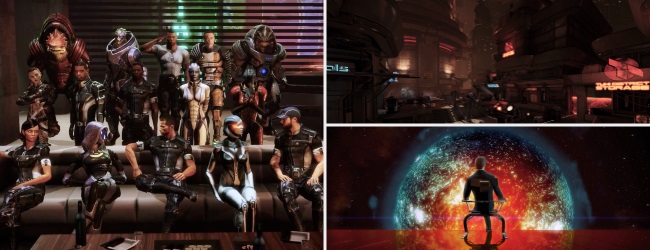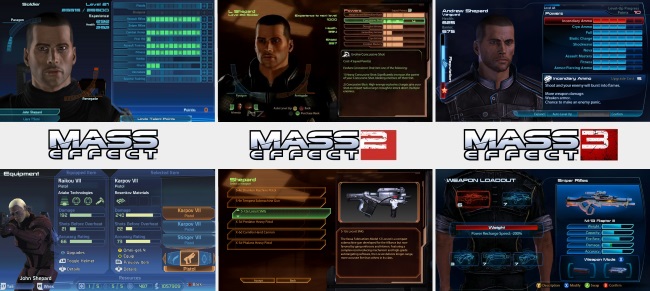
Bioware’s Mass Effect Trilogy is one of the most popular and highly regarded video game series of the PS3/360 generation. It’s certainly one of the most talked about too. So, after years of hearing stories of galactic war, decision based narrative and inter-special romance, I thought it was about time I played the series for myself. If you haven’t played it yet, it’s about time you did too. Unless you’ve been living under a rock in the ocean of a distant, undiscovered planet, you probably know the basics of Mass Effect. It’s an action based space opera, adapting to the choices you make as you play through the narrative. As you level up, shoot baddies and travel the galaxy, you’ll meet interesting alien species and explore diverse worlds.

Each game stars Commander Shepard; an avatar of the player’s creation. Shepard’s back-story, personality and appearance can be decided on upon starting a new game in ME1, and you can carry your same character through the entire trilogy. During the first game, Shepard is enlisted as a Spectre – an agent of the Citadel Council – to get to the bottom of strange attacks throughout the galaxy. In ME2, Shepard is tasked with assembling a team to take down The Collectors; an alien race with a remarkably cliché sci-fi name which has started abducting human colonies. The third game has Shepard uniting the galaxy against an enormously powerful threat to all life. Though the trilogy tells one overarching narrative, the individual stories of each game provide unique tones and motivations – each does feel different.
There’s nothing particularly ground-breaking in the premise, but the way each game’s story unrolls and connects to one another gets pretty interesting. Of course, it helps that a rich lore detailing the history of dozens of interesting species and their relations with one-another is developed through the series. There are so many planets, races, and historical events to hear about, and Bioware does a great job of making all of them worth remembering for their own reasons. Going into it, I could’ve told you that Liara is the blue lady. Now, I could debate the merits of the Genophage, discuss the goals of the Leviathan, consider the plans of the Rachni, or tell you that Benedict Cumberbatch looks like a Salarian.

With there being so much to learn about, I didn’t expect to care about most of the information being thrown at me. I couldn’t have been more wrong. The key though, is that it wasn’t thrown at me. Piece by piece, you learn about this universe through the people you talk to and the places you visit. I never stopped to learn these things, I just got to know them. If you are the type to stop and read about the universe you’re playing in though, all three ME games have an extensive selection of Codex Entries detailing everything. I understood everything that was going on in this huge, rich galaxy without ever reading these though, and that, to me, is proof that this was an absolutely expertly crafted and delivered experience.
The single most important factor in immersing the player in this crazy universe though, is the possibility of interaction with the story. Throughout the series you’re given opportunities to make decisions. What I love about the choices in ME is the range of scale and importance each one holds. Sometimes your decisions will result in the life or death of unimportant or major characters, sometimes a relationship will unravel a certain way due to your influence. Your decision might make no difference whatsoever, or it might decide the fate of an entire race. I stopped to think about every choice I made. Each decision matters in a completely different way to the last, and everything around you feels like it’s been shaped by you.

Mass Effect is a third-person, cover-based shooter, role playing game. For each mission, you’ll bring along two squad members of your choice. Whether you choose to bring your best buds or those with the most suitable abilities, the dynamics of the game can change quite a bit depending on who you spend the most time with. Not only will you hear alternate conversations, but your gameplay opportunities differ fairly significantly. As Commander, you’re able to order your comrades into the positions you think most effective, or to use one of their powers. Powers range from projectiles, to elemental effects on your ammo, to an assistant combat drone. As well as each squad member, Shepard has a bunch of powers of his own – depending on which class you choose.
This gets me to one of my least favourite things about the first game. The class you choose in ME1 is heavily restrictive. I was able to use pistols and snipers in my playthrough, with all other weapons being rendered practically useless. To make matters worse, the powers that come along with the weapons-heavy classes are totally uninteresting; shoot faster for a while, take more damage for a while, all the lame stuff. While I’m talking about ME1’s shortcomings, it’s worth mentioning that its gameplay is not good. I loved the story, characters and setting so much that I still enjoyed the game, but I really just wanted to get through the actual shooting as fast as possible. It plays like an original Xbox launch game. Really, it’s some super sketchy stuff.

It probably goes without saying though, that Mass Effect 2 is an astronomical improvement on this. I went straight from 1 to 2, and it totally blew me away. On top of all the extra great stuff I’ll get to, what was annoying and bland combat was turned into well polished, enjoyable gameplay. I’m pretty tired of third-person shooting at this point, but ME2 is easily comparable to the likes of Uncharted or Gears of War; some of the best. Thankfully, the ridiculous restrictions of ME1 are also gone in 2. The third game’s ultimate improvements on the gameplay result in the perfect realisation of how I’m sure ME1 was intended to play.
Perhaps more important than its role as a shooter, is that Mass Effect is a role playing game. This means quests, this means stats, and this means levelling up. Unlike the evolution of the gameplay through the series, the RPG stuff has ups and downs. ME1 has some pretty cumbersome equipment options that really just slow everything down and get in the way. ME2 gets rid of all of this and leaves the gear and weapons customisation more akin to a shooter than an RPG. Rather than collecting loads of gear everywhere you go and having to deal with a constantly filling inventory, armour and weapons are pretty different from one another, and inventory management is completely gone. Thankfully, ME3’s systems are much the same.

Something that certainly doesn’t improve through the sequels is the quest system. Mass Effect 1’s quest log is simple: you have missions and assignments. Missions are your normal story quests, while assignments act as side-quests. As you progress through a quest, the log updates and keeps you informed as to where to go and what to do at each point in the mission. In the second game it’s pretty much the same deal. In Mass Effect 3, it’s a very different story. It’s not just a step below the others – it’s bad. First off, all missions are clumped together in one menu rather than split between two seperate priority lists. More importantly, quests are not tracked or updated at all. If a mission has several steps to it, you’re going to have to remember which you’re up to on your own – a huge annoyance when you’re travelling all the way across the galaxy to get stuff done.

As if that weren’t bad enough, the side quests of ME3 (with the exception of six N7 missions) are all the same, all boring, and all the worst possible match to this mission system. They’re all fetch quests. All of them. At a certain point, I was used to having a mission log constantly full of the least helpful instructions on how to do the least entertaining things. I stopped completing any of the side quests, and that sucks. Not just because it meant there was less to do in this awesome universe, but because the first two games got it so right. Especially the second.
One of my favourite things about Mass Effect 2 was loyalty missions. These are one off missions you’d go on at the request of a squad member, rewarding you with their loyalty. They were a chance to spend more time with each character and learn some interesting back story all the while. Put that back to back with ME3’s poorly tracked fetch quests and I can’t say that the final game, at least overall, was the best of them.
I should point out that there are considerable improvements present in Mass Effect 3 though , despite my criticisms. Where ME2 had super annoying, dumb hacking mini-games, 3 had none. Moving around in the first and second games felt pretty clunky; an issue 3 did away with. Movement is much smoother, Shepard can jump small gaps, and climbing ledges is much less of an annoyance. These changes afforded Bioware some much more interesting level design options, and ME3’s environments have way more verticality to them than those of it’s predecessors.

The second and third game both have a fair bit of downloadable content available; I played all of it. So let me tell you, not only are the DLC packs worth playing, but they’re some of the best parts of the series. Maybe it’s because they stood out among a sea of lame fetching, but I thought ME3’s DLC in particular was really good. Interesting gameplay twists, more time with the friends I’d spent so much time with at this point, and some cool story content. Playing ME3 without the DLC would be a significantly less enjoyable experience. It is worth mentioning though, that I spent more money on Mass Effect 3 DLC than I did on the Mass Effect Trilogy discs. If you’re going to play Mass Effect, don’t skip the DLC.
I mentioned that Mass Effect 1 played like an original Xbox game. At times, it looks like one too. Environments, especially on non-story related planets, look horrendous. Even by 2007 standards. A lot of these places resemble the kind of crappy 3D games you could play in a bowser in the early 2000s. Strangely enough though, a lot of other stuff looks good. Character models and certain indoor places look, if anything, ahead of their time. When it comes to the second and third game, things are much prettier. There are certain points in 2 and 3 where I stopped to look across beautiful skyline or into a breathtaking vista.

Voice performances, I felt, ranged from excellent to average. Male Shepard’s actor always seemed especially bland and robotic to me, but it certainly improved through the games. Other characters were captured awesomely. Miranda and Garrus in particular are characters I really grew to love, and the superb performances certainly had a large hand in that. Good acting is paramount in a game like Mass Effect, so it’s nice that lacklustre performances are few and far between. All three games are really well scored as well. Most of the music helps to set the mood and is pretty unmemorable, but there are a few awesome tracks that’ll really get stuck in your head too. Most importantly, there’s a great cosmic and mysterious atmosphere provided by some well written and produced music.
I do feel like I have to mention a bug I encountered consistently through ME2, though. Dialogue would often drop in pitch to the point of inaudibility. It’s a pretty substantial problem for such a character and dialogue driven experience, but thankfully it only ever happened during action segments, and not important conversation. On that note, frame stuttering in the first game is a constant struggle. I got caught in tables a couple of times and silly things like that, but outside of these major issues, the games run and play well.
The Mass Effect Trilogy is one of the best experiences of its generation. Though each game has its own strengths and weaknesses, as a complete package, there’s so much here worth exploring. Interesting characters, beautiful worlds, rich lore, and good, solid gameplay come together to provide a fun, interesting, and rewarding adventure. These are three games you really should play.











